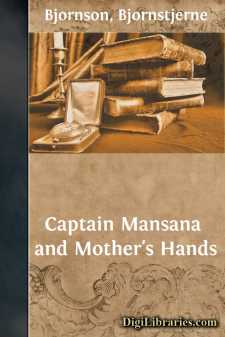Categories
- Antiques & Collectibles 13
- Architecture 36
- Art 48
- Bibles 22
- Biography & Autobiography 813
- Body, Mind & Spirit 142
- Business & Economics 28
- Children's Books 17
- Children's Fiction 14
- Computers 4
- Cooking 94
- Crafts & Hobbies 4
- Drama 346
- Education 46
- Family & Relationships 57
- Fiction 11829
- Games 19
- Gardening 17
- Health & Fitness 34
- History 1377
- House & Home 1
- Humor 147
- Juvenile Fiction 1873
- Juvenile Nonfiction 202
- Language Arts & Disciplines 88
- Law 16
- Literary Collections 686
- Literary Criticism 179
- Mathematics 13
- Medical 41
- Music 40
- Nature 179
- Non-Classifiable 1768
- Performing Arts 7
- Periodicals 1453
- Philosophy 64
- Photography 2
- Poetry 896
- Political Science 203
- Psychology 42
- Reference 154
- Religion 513
- Science 126
- Self-Help 84
- Social Science 81
- Sports & Recreation 34
- Study Aids 3
- Technology & Engineering 59
- Transportation 23
- Travel 463
- True Crime 29
Captain Mansana and Mother's Hands
Description:
Excerpt
CAPTAIN MANSANA
CHAPTER I
I was on my way to Rome, and as I entered the train at Bologna, I bought some newspapers to read on my journey. An item of news from the capital, published in one of the Florence journals, immediately arrested my attention. It carried me back thirteen years, and brought to mind a former visit I had paid to Rome, and certain friends with whom I had lived in a little town in the vicinity, at the time when Rome was still under the Papal rule.
The newspaper stated that the remains of the patriot Mansana had been exhumed from the Cemetery of the Malefactors in Rome, at the petition of the inhabitants of his native town, and that in the course of the next few days, they were to be received by the town council and escorted by deputations from various patriotic associations in Rome and the neighbouring cities to A——, Mansana's birthplace. A monument had been prepared there, and a ceremonial reception awaited the remains: the deeds of the martyred hero were at length to receive tardy acknowledgment.
It was in the house of this Mansana that I had lodged thirteen years before; his wife and his younger brother's wife had been my hostesses. Of the two brothers themselves, one was at that time in prison in Rome, the other in exile in Genoa. The newspaper recapitulated the story of the elder Mansana's career. With all, except the latter portion, I was already pretty well acquainted, and for that reason I felt a special desire to accompany the procession, which was to start from the Barberini Palace in Rome the following Sunday, and finish its journey at A——.
On the Sunday, at seven o'clock in the morning of a grey October day, I was at the place of assembly. There was collected a large number of banners, escorted by the delegates, who had been selected by the various associations: six men, as a rule, from each. I took up my position near a banner that bore the legend: "The Fight for the Fatherland," and amongst the group which surrounded it. They were men in red shirts, with a scarf round the body, a cloak over the shoulders, trousers thrust into high boots, and broad-leaved plumed hats. But what faces these were! How instinct with purpose and determination! Look at the well-known portrait of Orsini, the man who threw bombs at Napoleon III.; in him you have the typical Italian cast of countenance often seen in the men who had risen against the tyranny in Church and State, braving the dungeon and the scaffold, and had leagued themselves together in those formidable organisations from which sprang the army that liberated Italy. Louis Napoleon had himself been a member of one of these associations, and he had sworn, like all his comrades, that whatsoever position he might gain, he would use it to further Italy's unity and happiness, or in default that he would forfeit his own life. It was Orsini, his former comrade in the Carbonari, who reminded Napoleon of his oath, after he had become Emperor of the French. And Orsini did it in the manner best calculated to make the Emperor realise the fate which awaited him if he failed to keep his pledge....








